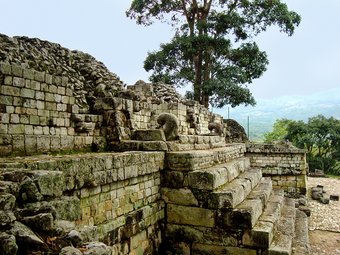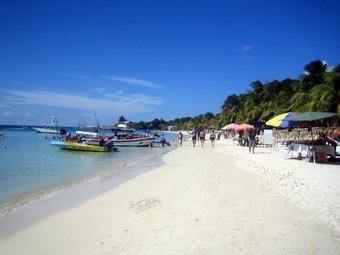Honduras Travel Information
From rainforests to vibrant reefs, Honduras boasts a natural beauty unlike any other. This quintessential Caribbean country offers a diverse culture, gorgeous views and a unique national identity, which both excites and charms tourists.
On this site we listed all the important information about the country. Get an overview about this unique country and its people, get informed about the visa requirements, the currency and the best time to travel.
Entry and Exit
Tourists visiting Honduras must have a valid passport, as well as proof of a return ticket before entering Honduras.
Visitors travelling from the following countries do not need a visa, and are granted access for up to 90 days:
- Australia
- Britain
- Canada
- USA
- Members of the European Union
Tourists from these countries are only allowed to stay in Honduras for a period of up to 90 days – these entry visas can be extended at immigration offices upon their arrival. Passports must be valid for 6 months from the date of arrival in Honduras.
Nationalities not mentioned above will require a tourist visa which can be obtained for single entry at US$30 per person.
Exit Regulations and Custom Information
Tourists are permitted to carry the following items into Honduras:
- 200 cigarettes, 100 cigars or 1 pound tobacco
- Two quarts of alcoholic beverages
- Perfume for personal use only
- Gifts up to a monetary value of US$50-00
- Hunting and sporting weapons with a maximum of 500 ammunitions – permit is required from the Ministry of State Security Office.
Tourists are advised to obtain health insurance prior to their arrival in Honduras; it is also recommended that tourists consult with a medical practitioner 4-6 weeks prior to their departure, to ensure that all vaccinations are up to date.
The following vaccinations are recommended for tourists travelling to Honduras:
- Malaria Prophylaxis is recommended as well as mosquito nets in and around coastal areas – 80% of regions in Honduras are considered malaria areas.
- Diphtheria vaccinations are recommended.
- Hepatitis A
- Rabies vaccines are recommended – especially in children over the age of 2 years.
- Tetanus vaccines should be up to date at all times and should be re-administered every 10 years.
- Typhoid vaccines are recommended.
- Yellow Fever certificates are required for tourists travelling from affected areas.
Please Note: Tap water and fresh milk are considered unsafe to drink. Water used for drinking, bathing, brushing teeth and ice should be boiled and sterilised first. Unpasteurised milk is to be avoided, and tinned or powdered milk should be used. All meat products must be cooked well and fruit and vegetables peeled and/or cooked before consumption. Meat and dairy products from street vendors and markets should be avoided.
Travel Facts for Honduras
Honduras boasts a tropical yet temperate climate inland and towards the coasts of the Caribbean and the Pacific. This warm and inviting climate reaches an average high of 32◦C, and seldom drops below an average of a comfortable 20◦C. With a clear difference between the wet and dry seasons of Honduras, tourists will have ample opportunity to decide which season suits them best. The wet season occurs between April and October, while the dry season begins in November and ends around March.
Areas situated at a higher altitude do experience cooler climes but are still considered comfortable. Hurricane season usually occurs between June and November, and while these instances are quite common along the Caribbean coast. Many tourists do still travel to Honduras during this time and can rest assured that weather notices and local authorities do endeavour to ensure that everyone affected remains safe until the weather conditions settle down.
Honduras falls under the UTC/GMT – 06:00 and does not utilise daylight savings time.
The Honduran Lempira (HNL) is the official currency of Honduras. The most popular currency exchange takes place between the Honduran Lempira (HNL) and the US Dollar (USD). Although the Honduran Lempira is the official currency of the region, some places do still accept the US Dollar as a means of payment. If the dollar is not accepted, credit cards and travellers’ cheques are accepted more often than not. It is advised that tourists do not carry all of their travellers’ cheques or large sums of cash on their body at any time of the day or night.
Honduras uses a 110-120 Volt current, as well as electrical sockets similar to those used in the United States as well as Canada. Tourists are always reminded to bring adaptors and voltage reducer/step up transformers if their appliances use different voltages.
There are a number of internet service providers in Honduras if tourists are considering going directly for internet connectivity. While this is an option, tourists staying for shorter periods of time will be able to use WiFi and regular internet access at travel resorts, some restaurants and bars as well as at a number of internet cafés spread around the country. Internet cafés are relatively inexpensive and offer adequate speeds.
+504 is Honduras’ country dialling code. When phoning Honduras from an international line the following dialling format will need to be used: 00 (+504) area code and number. Honduras’ numbers are made up of eight digits. Hotels and payphones will usually have a list of country codes available, to ensure that every tourist has the option to call international lines if they so require.
US Embassy: +504 2236 9320
Police: 199/+ 504 2237 1400
Red Cross: 195/ +504 2227 7575
Fire Department: 198
It is always advisable to get numbers and addresses of regional emergency service numbers and addresses of embassies and hospitals. Most resorts and hotels will have emergency personnel and medical practitioners on staff or on call at all times, so don’t hesitate to contact the resort concierge for any information.
People and Landscape
There are over 8.3 million people in Honduras, with the population being made up of 90% Mestizos. White, black and Amerindian make up the remaining 10% of the population. This remarkable Central American country is a welcoming nation, which has resulted in other ethnicities showing interest in making Honduras home.
Spanish is the official language of Honduras, but there are a number of regional languages which are recognised in the country. These regional languages include Garifuna, Miskito, Bay Islands Creole English and some lesser known indigenous languages. English can be heard in the predominantly tourist areas, but more often than not the language has been influenced by the regional creoles.Honduras’ culture is famously multi-cultural, with elements of a variety of nationalities and cultural presences present in the modern day Honduras. As a large part of Latin America, a number of cultural traditions can be attributed to this dynamic cultural origin. Spanish culture is also very prominent throughout Honduras. Colour, music and light – usually fireworks are all present during cultural celebrations and contribute towards the country’s vivacious and exciting atmosphere.
Most of Honduras’ cultural traditions have been born from the Roman Catholic religion, and almost all festivals and celebrations have a religious aspect right at the very core of the cultural event. As indicated throughout the cultural element of the country, Roman Catholicism is the main religion of the region. As a result of the country’s diversity, a number of other religions have set roots in Honduras including Episcopal, Lutheran, Jehovah’s Witness and Evangelical Protestant groups.
Honduras boasts beautiful coastlines, lush mountains, deep valleys and a variety of cultivation fields. From beautiful beaches to mangrove swamps and palm lined regions, Honduras showcases an element of natural wonder that attract tourists from all over the world.
65% of Honduras is made up of gorgeous mountains and flowing valleys. Combined with the spectacular Caribbean and Pacific coastlines and the abundant fields of tobacco, coffee, rice, cotton, grains, fruit and vegetables, Honduras’ landscapes are both beautiful and bountiful. The waterlogged terrain of the East has also created lovely mangrove swamplands and rivers that are as awe-inspiring as the Caribbean ocean of its region.
Mealtimes in Honduras are considered a culinary treat for visitors from all over the world. Breakfast is a delicious combination of scrambled eggs, beans, tortillas and orange juice or coffee. American-style breakfasts have also become quite popular and are usually a combination of the traditional Honduran breakfast, served with toasts and jams. Most meals are made up of grilled meats, chicken or seafood and served with rice, beans and tortillas. Crunchy deep fried plantains known as Tostones and hot black beans and cheese dips are also favoured appetizers in the region and are considered a must-taste for all visitors.
Tourists with an untamed sweet tooth will love the local desserts including, a layered cake soaked in cream, evaporated and condensed milk, known as Tres Leches Cake and a delightful rice pudding, seasoned with cinnamon, sugar and other spices, known as Arroz Con Leche.
Beer and sugar cane liquor are brewed to perfection in the region, but for a more daring beverage why not sample the fiery Garifuna liquor known as Giffity? This drink is not for the faint-hearted, so beware when trying it.
Sightseeing
Bienvenido a Honduras - like in almost all countries in Central America you can find a rich culture in Honduras. But not only the Maya ruins of Copán are worth a visit, Honduras has also a lot of nature to offer. How about a visit to the Islas de Bahía?
No matter if you are interested in culture or nature - in Honduras you can find both. We listed all the highlights of the country for you to provide you all information about the must-sees in Honduras. Have a look at our Highlights in Honduras.


If you are well informed about Honduras now, have a look at our trips to Honduras or contact our team.
Current Situation
Please keep in mind, that the security situation at place can change at any time. Therefore we recommend to have a look at the current safety information at Global Affairs Canada or Foreign and Commonwealth Office.
Exclusion of Liability
Those who choose to travel do so entirely at their own risk. SC Travel Adventures endeavours to inform tourists of the risks involved with travelling but cannot be held liable for any events which occur outside of their direct control. Tourists are advised to avoid areas considered unsafe, remain vigilant and cautious at all times throughout their stay, and heed the advice of local authorities.
